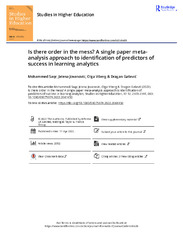Please use this identifier to cite or link to this item:
https://rfos.fon.bg.ac.rs/handle/123456789/2302Full metadata record
| DC Field | Value | Language |
|---|---|---|
| dc.creator | Saqr, Mohammed | |
| dc.creator | Jovanović, Jelena | |
| dc.creator | Viberg, Olga | |
| dc.creator | Gašević, Dragan | |
| dc.date.accessioned | 2023-05-12T11:40:39Z | - |
| dc.date.available | 2023-05-12T11:40:39Z | - |
| dc.date.issued | 2022 | |
| dc.identifier.issn | 0307-5079 | |
| dc.identifier.uri | https://rfos.fon.bg.ac.rs/handle/123456789/2302 | - |
| dc.description.abstract | Predictors of student academic success do not always replicate well across different learning designs, subject areas, or educational institutions. This suggests that characteristics of a particular discipline and learning design have to be carefully considered when creating predictive models in order to scale up learning analytics. This study aimed to examine if and to what extent frequently used predictors of study success are portable across a homogenous set of courses. The research was conducted in an integrated blended problem-based curriculum with trace data (n = 2,385 students) from 50 different course offerings across four academic years. We applied the statistical method of single paper meta-analysis to combine correlations of several indicators with students' success. Total activity and the forum indicators exhibited the highest prediction intervals, where the former represented proxies of the overall engagement with online tasks, and the latter with online collaborative learning activities. Indicators of lecture reading (frequency of lecture view) showed statistically insignificant prediction intervals and, therefore, are less likely to be portable across course offerings. The findings show moderate amounts of variability both within iterations of the same course and across courses. The results suggest that the use of the meta-analytic statistical method for the examination of study success indicators across courses with similar learning design and subject area can offer valuable quantitative means for the identification of predictors that reasonably well replicate and consequently can be reliably portable in the future. | en |
| dc.publisher | Routledge Journals, Taylor & Francis Ltd, Abingdon | |
| dc.rights | openAccess | |
| dc.rights.uri | https://creativecommons.org/licenses/by/4.0/ | |
| dc.source | Studies in Higher Education | |
| dc.subject | student success | en |
| dc.subject | reproducibility | en |
| dc.subject | portability | en |
| dc.subject | meta-analysis | en |
| dc.subject | Learning analytics | en |
| dc.title | Is there order in the mess? A single paper meta-analysis approach to identification of predictors of success in learning analytics | en |
| dc.type | article | |
| dc.rights.license | BY | |
| dc.citation.epage | 2391 | |
| dc.citation.issue | 12 | |
| dc.citation.other | 47(12): 2370-2391 | |
| dc.citation.rank | M21~ | |
| dc.citation.spage | 2370 | |
| dc.citation.volume | 47 | |
| dc.identifier.doi | 10.1080/03075079.2022.2061450 | |
| dc.identifier.fulltext | http://prototype2.rcub.bg.ac.rs/bitstream/id/830/2298.pdf | |
| dc.identifier.rcub | conv_2648 | |
| dc.identifier.scopus | 2-s2.0-85129188383 | |
| dc.identifier.wos | 000781050300001 | |
| dc.type.version | publishedVersion | |
| item.cerifentitytype | Publications | - |
| item.fulltext | With Fulltext | - |
| item.grantfulltext | open | - |
| item.openairecristype | http://purl.org/coar/resource_type/c_18cf | - |
| item.openairetype | article | - |
| Appears in Collections: | Radovi istraživača / Researchers’ publications | |
SCOPUSTM
Citations
22
checked on Nov 17, 2025
Page view(s)
14
checked on Dec 28, 2025
Download(s)
4
checked on Dec 28, 2025
Google ScholarTM
Check
Altmetric
This item is licensed under a Creative Commons License


